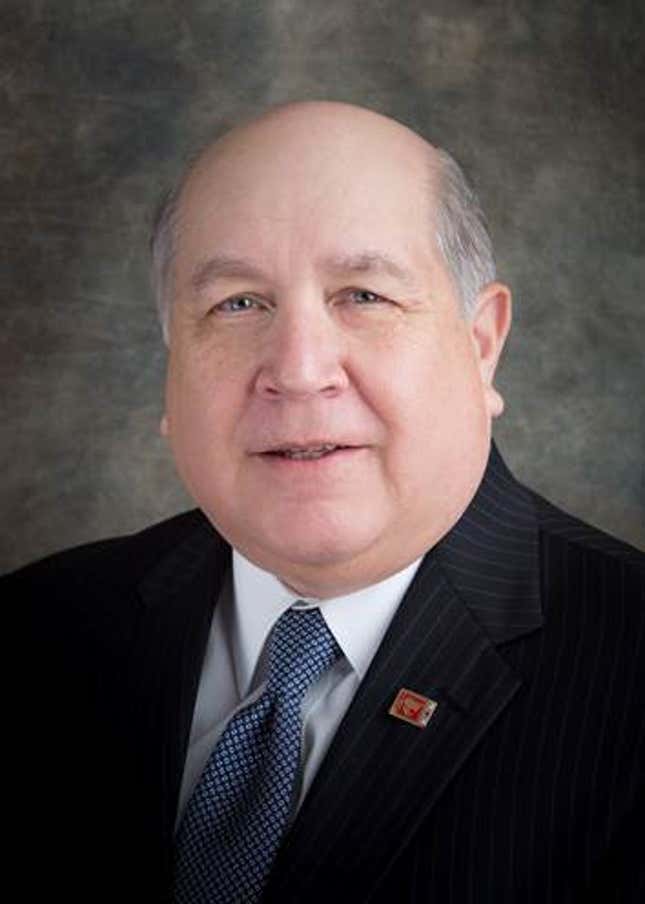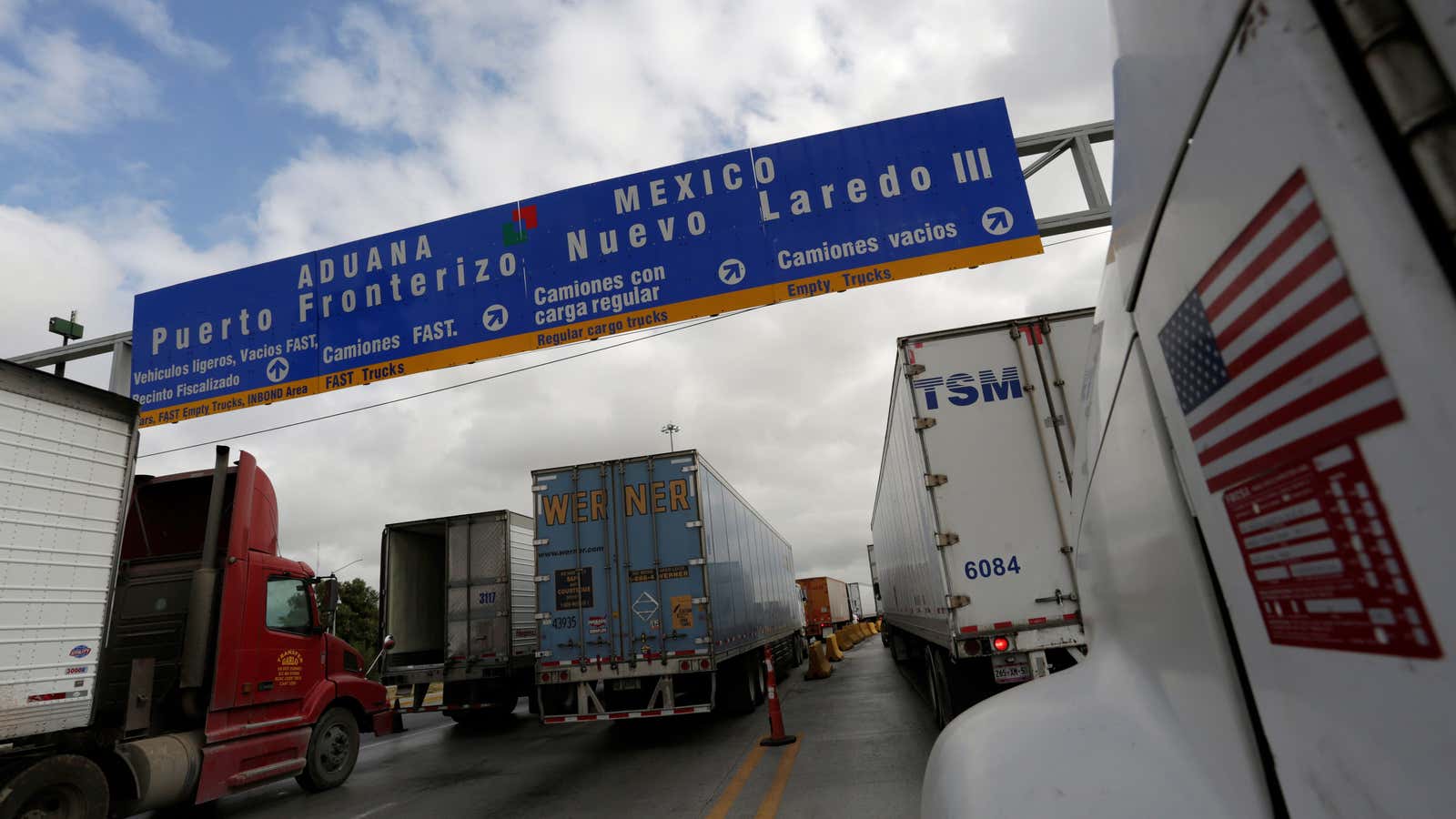Gerry Schwebel has been a NAFTA champion for nearly three decades.
In the early 1990s, he was part of a coalition of free traders that lobbied for the deal in a divided Congress, testifying before skeptical lawmakers on its merits himself.
After NAFTA was approved, he helped his employer, the Laredo, Texas-based International Bank of Commerce or IBC, grow from a small community bank into an $11 billion-plus cross-border operation. These days, he’s head of IBC’s international division, whose binational client roster is involved in every aspect of getting goods from one side of the border to the other.
He’s also a supporter of Donald Trump, who famously described NAFTA as “the single worst trade deal ever signed in this country.”
You’d think such a fundamental difference of opinion would be a deal-breaker for Schwebel—and indeed, for pro-trade conservatives across the country. The fact that it hasn’t been is indicative of the uncomfortable position much of the Texas business establishment currently finds itself in.
The state has been a big beneficiary of NAFTA. Its border with Mexico has made Texas the US’s top exporting state. The goods it sends to Mexico alone are worth nearly 6% of its GDP. Over a million Texans have jobs related to international trade, more than are employed in manufacturing or construction.
The state’s leaders are strict adherents to core pieces of the Republican platform designed to appeal to business: light regulation and low taxes. Candidate Trump, a businessman, already subscribed to those policies. Ahead of the election, many made the risky wager that Trump would come around to the business case for trade as well. (ICB’s CEO, Dennis Nixon, for example, was a major campaign fundraiser for Trump in Texas.)
So far, though, president Trump has given few indications he’s changed his mind. In a matter of weeks, he’s pushed US-Mexico relations to their lowest point in decades, and was still calling NAFTA “a catastrophe” earlier this month.
We talked to Schwebel about NAFTA’s past, and how he and others are trying to ensure its future. The conversation has been edited for clarity and brevity.

What has been the balance of NAFTA in Texas?
US-Mexico trade has such a tremendous impact on the Texas economy. It’s very positive. When you look at the volume of trade, about 75% of the US-Mexico land trade, approximately $343 billion dollars in 2015, crosses via Texas ports of entry.
In 2015 , Texas exports reached $248 billion. As we compare ourselves to other states like California—that was about $165 billion, and the state of Washington was $86 billion—by far, Texas has benefitted the most from our proximity to Mexico.
What can the rest of the country learn from Texas about how to do business under NAFTA?
One element that seems to be perhaps ignored is the business climate of the state of Texas. There’s the geographic location—being so close to Mexico and being tied to Mexico adds to that—but compare the Texas business climate with states like New York or other states like Michigan and Ohio, which many believe were impacted negatively by NAFTA. We are a pro-business state. Texas doesn’t have a state income tax. Our tax structure makes us more attractive to businesses from the United States.
It comes with its price. We’re also a rapidly growing state. As we bring in the businesses, we bring in the people. That’s part of our whole demography. When people talk about jobs going out of the country, we should also pay attention to the jobs that are moving throughout the country. Jobs are moving from the north to the south, to states like Oklahoma and Texas.
By supporting Trump, you essentially put business-friendly policies such as low taxes ahead of trade. How does that calculation look after the first few weeks into his term?
He’s weighing all options. I don’t think he’s closing his mind to any ideas. We’ll see what those are and we’ll continue to contribute our input. We believe that down here, across the whole border, we’ve had some good experiences. That there’s room for improvement, absolutely, and we want to be part of any improved process of creating jobs, of having a stronger economy, of building America, of making it great again. We’ve just gone through eight years of hard times so we think changes are necessary.
I continue to support him and I will continue to voice my opinions. He is our president. We have to work with the new administration to continue to make our country strong and better.
Given its support for then-candidate Trump during the election, how much leverage does the Texas business community, including your bank, have to help shape his trade policy as president?
I don’t think the word “leverage” is the right one. Yes, we’ve been supportive of more Republican candidates. We tend to agree more with those philosophies of fiscal conservatism, but at the end of the day, we’re just like you are, a person who votes and a person who has an opinion.
We are a large business. We have close ties to members of the Trump administration. We have friends there. All we can do is share our story. That’s what we’ll continue to do and we hope they take into consideration.
The facts speak for themselves. Texas has benefitted from solid, good trade practices with countries like Canada and Mexico. They will always be our neighbors, so we need to have good trade relationships with our neighbors.
As we inform and put the facts on the table, I think the president and his advisors will understand that the benefits far outweigh any potential damage that some parts of the country have experienced.
Were you surprised by how quickly the president has moved on campaign promises such as erecting a wall along the US-Mexico border and renegotiating NAFTA?
There’s no question that the president has hit the road running. It’s no secret what he wanted to do. Yes, the rhetoric has been hard, but rhetoric is like everything else. He’s a businessperson. If each state does its homework and through its governors, through its companies, through its small businesses, tells a story of the impact of trade on jobs—which is what everybody wants—and the impact on the US being able to compete, to have affordable products, we will come to an agreement.
It’s important that we let time take its course. Let the cabinet settle down. Let the president with his full team do his job like any new president. Only time will tell.
Do you see how NAFTA could be renegotiated to address Trump’s non-trade related complaints about the border, such as border security and illegal immigration?
Definitely. Border security is a component. We look for the secure flow of trade and people. We live in the border. We have the most at stake.
We work in Laredo. Therefore we have some sound ideas on border security, on immigration reform, and on trade that we’ve shared with the administration. For example, we in Laredo have a river, the Río Bravo, the Rio Grande, whatever you want to call it, and that’s a natural barrier. One of the proposed ideas is to clean up both sides of the river of all the vegetation, so that our border patrol inspectors on the US side and inspectors on the Mexican side have clear line of sight, instead of having all that vegetation where the criminal elements may be hiding. That would go a long way in providing border security.
On immigration reform, we all have to be engaged and involved. There’s definitely room for improvement. At the end of the day, all of these cases of people wanting to come to our country need to be vetted and reviewed. We have a shortage of adjudication judges. The process is quite lengthy. You allow someone to come into the country and take an application, and then let them stay in the country, and wait till they get an appointment to be reviewed…that process has taken in most instances more than a year. That’s quite frankly too long a time. That process needs to be reviewed.
You’ve been on the front lines of NAFTA for more than 20 years. Can you put the current debate in that historical context?
If you go back to what was happening in early 1990s, that process had a lot of debate. You had Democrats who were not in favor, and the Republicans were driving this agreement. It did require bipartisan support.
There were a lot of things that happened in 1994 that should have made people say that NAFTA would fail in its first year of existence. Just in Mexico alone. The Zapatista movement in January was the first example, a rebellion against the Mexican government. Then in March of 1994 [presidential candidate] Luis Donaldo Colosio was assassinated. Then on Dec. 22 of 1994, the largest peso devaluation happened. You’d think that NAFTA would have not survived—even in the US, with all the crises that have happened since 1994 to the present.
But our economies have been resilient. Governments, they change, and they come and go. It’s the people who trade, whether it’s between two, or three, or with the world, who are the survivors of these crises.
You were raised on both sides of the border and have been doing business in both countries. How does that inform your understanding of the global economy?
I’m an American, but I also have family roots in Mexico. My father, who’s Jewish, fled the Holocaust and was admitted into Mexico. He was welcomed by Mexico. My mother’s family was welcomed by the United States. I’m the son of two immigrants. I happened to be born in the US and I’m a product of it.
Mexico has always been a part of my professional life. I’m head of the international division of our company. I’m the “international” in IBC. That’s the world we live in today. It’s a global economy.
When you have those bicultural or multicultural experiences, we may be more tolerant, but we’re also sensitive that the country that we live in, that we pledge our allegiance to, is the one we support.
